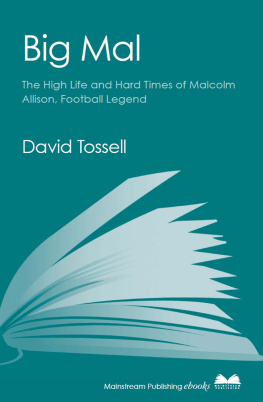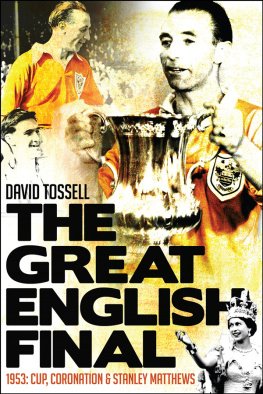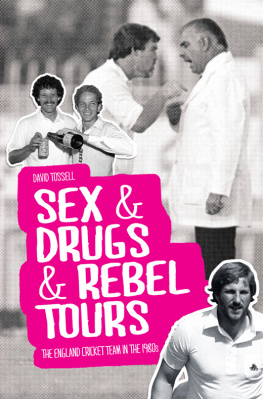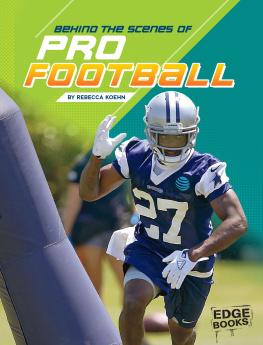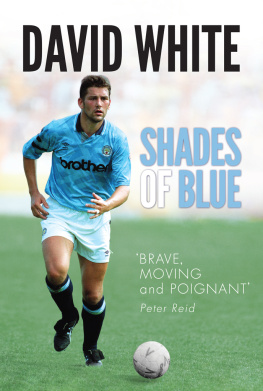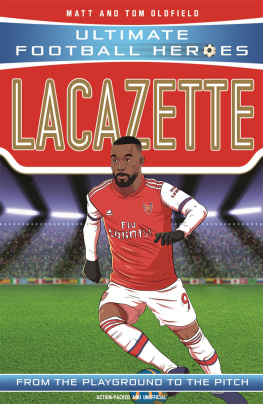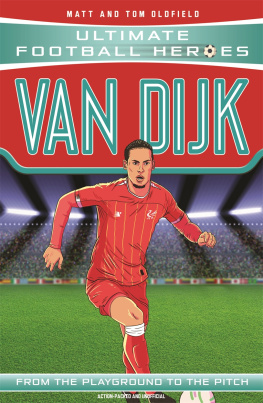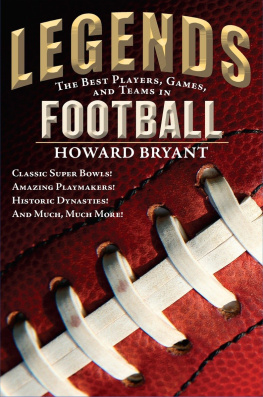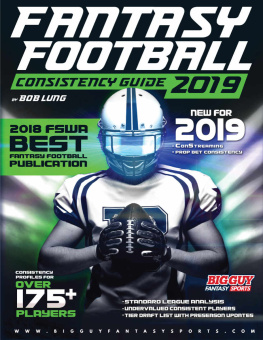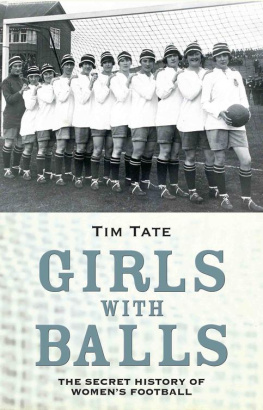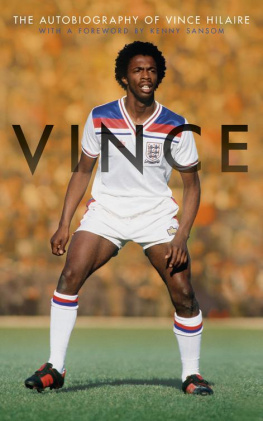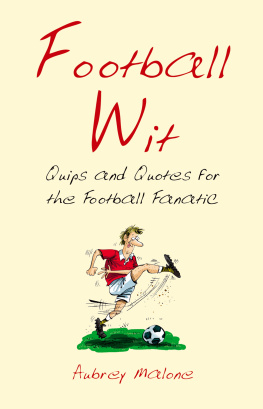CONTENTS
BIG MAL
The High Life and Hard Times of Malcolm Allison, Football Legend
David Tossell

This ebook is copyright material and must not be copied, reproduced, transferred, distributed, leased, licenced or publicly performed or used in any way except as specifically permitted in writing by the publishers, as allowed under the terms and conditions under which it was purchased or as strictly permitted by applicable copyright law. Any unauthorised distribution or use of this text may be a direct infringement of the authors and publishers rights and those responsible may be liable in law accordingly.
Epub ISBN: 9781780574653
Version 1.0
www.mainstreampublishing.com
This edition, 2009
Copyright David Tossell, 2008
All rights reserved
The moral right of the author has been asserted
First published in Great Britain in 2008 by
MAINSTREAM PUBLISHING COMPANY
(EDINBURGH) LTD
7 Albany Street
Edinburgh EH1 3UG
ISBN 9781845964788
No part of this book may be reproduced or transmitted in any form or by any other means without permission in writing from the publisher, except by a reviewer who wishes to quote brief passages in connection with a review written for insertion in a magazine, newspaper or broadcast
The author has made every effort to clear all copyright permissions, but where this has not been possible and amendments are required, the publisher will be pleased to make any necessary arrangements at the earliest opportunity
A catalogue record for this book is available from the British Library
ACKNOWLEDGEMENTS
M any peoples memories and opinions have helped to shape this story, so I am greatly indebted to all those with whom I have discussed Malcolm Allison during my research: Mark Allison, Colin Bell, John Bond, Tony Book, Alistair Brownlee, John Cartwright, Terry Cochrane, Joe Corrigan, Paul Crockford, Steve Daley, Derek Dougan, Don Howe, Gordon Jago, Stewart Jump, James Lawton, Francis Lee, Stuart Lee, Eddie Lewis, Graham Little, Terry McDonald, Bob McNab, Peter McParland, Gary Megson, Ian Mellor, John Newman, Bob Nichols, Ian Niven, Frank OFarrell, Jeff Powell, Norman Piper, John Radford, Nicky Reid, Don Rogers, Lynn Salten, Dave Sexton, Nigel Sims, Roger Spry, Mike Summerbee, Peter Taylor, Andy Tillson, Mike Trebilcock, Derek Ufton, Ron Walker and Alan Whittle.
I am particularly grateful for the support and assistance that was forthcoming from James Lawton and from Malcolms long-time partner, Lynn.
Tony McDonald, publisher of the retro West Ham magazine Ex, allowed me to make use of interviews appearing in his publication. If only every club could boast such an admirable journal. Richard Whitehead was his usual source of contacts and sound advice, while Phil Tanner went beyond the call of duty to provide information about Malcolms time at Bath City and Ian Whittell opened up many important doors in the Manchester area. Others who have assisted me in many and varied ways are: Phil Alexander, Derek Armstrong, Mike Blackstone, Mal Butler, Tony Ellis, Colin Ewenson, Peter Hall, Steve Harris, Shaun Keogh, John Ley, John Little, Paul Mace, Barry Mead, Ken Nicholl, Jim Platt, Neil Rioch, Haydn Parry, John Richards, Derek Robinson, Jonathan Sides, Brian Spurrell, Alan Stewart, Fred Street and Dave Thomas.
Thanks to Bill Campbell, Iain MacGregor, Graeme Blaikie and all the staff at Mainstream for their professionalism and support and to Andy Cowie at Colorsport and the staff at Getty Images and Rex Features for their assistance in sourcing photography for this book. I am grateful, as always, to all those writers and authors whose material has formed an important part of my research. I have endeavoured to acknowledge them in the bibliography.
Final thanks once more to my family, especially Sara, Amy, Sarah and Laura, for all their love and encouragement.
A percentage of royalties from this book has been donated to the Alzheimers Society (Registered Charity: 296645), which continues to research into all forms of dementia, offering care to sufferers and their families. Further information can be found online at www.alzheimers.org.uk.
1
MAN AND BOY
What would big Malcolm Allison do in a situation like this, eh?
Smack [him] over the head with a bottle of champagne and stub his Cuban out on his hand
Manchester CID members discuss how to deal with
a 1970s criminal (Life On Mars, BBC 1, February 2007)
I t was still only late August, the opening weeks of the 200607 season, but the familiar pattern had been re-established already. Even on their own ground, little consideration had been given to the likelihood of Manchester City achieving victory against a multinational, multi-talented Arsenal team whose ambitions of winning another Premiership title contrasted starkly to the home clubs more modest aspirations for the coming campaign. A penalty scored by Citys Joey Barton appeared merely to be delaying the inevitable. For most fans in the City of Manchester Stadium, games between these sides had usually conformed to this recognisable blueprint.
Spotting a recognisable face in the crowd, the Sky Sports cameras homed in. Here was a man whose influence almost 40 years earlier had made things very different. A man whose vision, planning, motivational powers and, often, sheer force of personality had made Manchester City the team against whom the likes of Arsenal measured themselves. The graphics operators hurriedly got to work. Up went the caption, Malcolm Allison, former Manchester City coach. Commentators were sufficiently distracted from the latest piece of Thierry Henry trickery to purr at the memory of Allisons achievements at the club: four major triumphs in a three-year span, including a complete set of domestic trophies and a European success.
Young viewers knowing only of life in the glossily packaged days of endless live televised football even those who had flown in the face of the modern trend by following City instead of rivals United blinked unknowingly at their screens. Those a little older might at least have been somewhat familiar with the name, perhaps heard some of the outrageous stories with which it had become associated. Anyone who had been watching football when Allison was in his glorious, exaggerated prime in the 1960s through to the 80s, was shocked by what they saw, even those who had heard the stories of his mental deterioration. The imposing physical figure was still evident under his grey jacket, even if it was hunched forward in his seat, but the eyes that used to sparkle with a potent mix of charm, wit and cunning seemed glazed and distant. The expression behind which a thousand schemes used to play, whether planning the next big game or deciding where to dine with his latest female companion, appeared bereft of any indication that he was aware of his surroundings.
On one hand, it was painful to see how one of the most expansive minds and sharpest personalities in footballs recent history had been diminished by the illness of dementia, into whose grip he had been slipping more completely over the previous five years. At the same time it was a chance to turn to younger companions and say, See that guy there? Well, let me tell you...
Preparation of this book was already well under way at the time of Allisons televised visit to the club where he had written himself into footballs lore. Those interviewed in the aftermath shared those mixed feelings: sorrow at Allisons plight; pride that their careers, and lives, had been touched by him; and gratitude that, at least fleetingly, he had emerged from a regimented existence in his council-run nursing home and was back in the public eye, being acknowledged for something more than the fedora hat and fat cigar that had become the enduring image of the man they called Big Mal.
Next page
